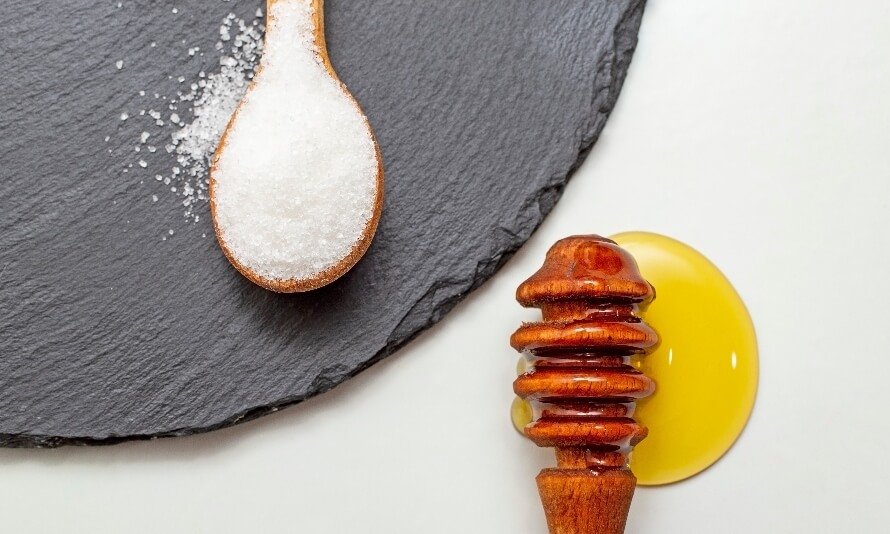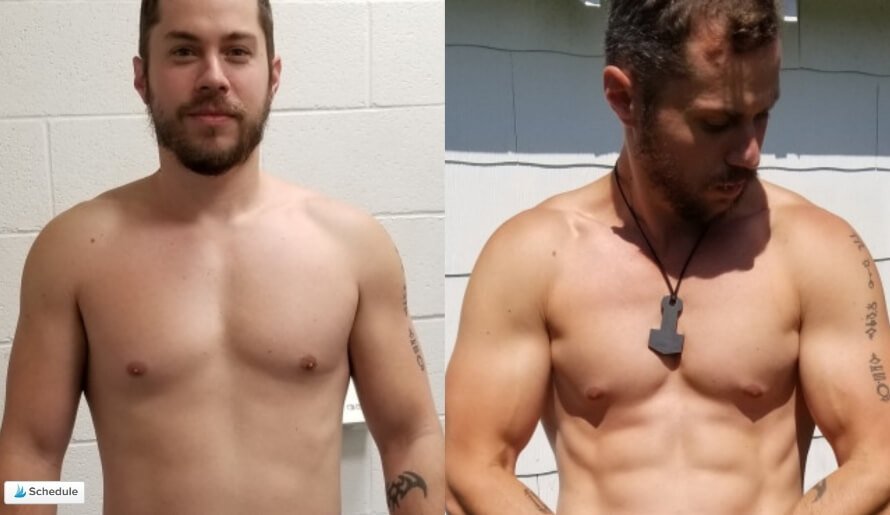[ad_1]
According to many social media health and fitness “gurus,” honey and salt pre-workout is a boon for athletic performance.
They claim that the salt and honey pre-workout mix provides an instant and sustained energy boost, enhances hydration, and improves electrolyte balance, which helps prevent brain fog, fatigue, and muscle cramps.
Not everyone is sold on the benefits, though. Skeptics say taking honey and salt as pre-workout delivers on none of its promises and is only popular because of its “natural” appeal.
Who’s right?
Where did the honey and salt pre-workout trend begin?
What are the purported benefits of taking this combo?
And does science agree?
Get evidence-based answers to these questions and more in this article.
The Origin of Honey and Salt Pre-Workout
Like most recent health and fitness fads, the honey and salt pre-workout trend started on social media.
A TikTok user shared a video of herself licking honey and salt off the back of her hand, claiming it was her new natural pre-workout routine.
The video caught the attention of other fitness enthusiasts, who began making and sharing their own videos of the honey and salt pre-workout mix.
While there isn’t a standard recipe that everyone follows, some suggest the most potent combination is honey and Himalayan salt for pre-workout. They believe the pink salt contains more minerals than regular salt, maximizing the pre-workout’s benefits.
The Purported Benefits of Honey and Salt Pre-Workout
The purported benefits of the honey and salt pre-workout supplement include:
- Quick Energy: Honey is a simple carbohydrate that your body quickly breaks down into glucose (blood sugar), giving you an immediate energy boost.
- Electrolyte Replenishment: Honey and salt contain electrolytes. Those taking honey and salt pre-workout claim it optimizes electrolyte balance and replenishes electrolytes lost through sweat during long weightlifting workouts and endurance exercise.
- Hydration: Fans of honey and salt pre-workout say the combination boosts hydration in two ways. First, the honey contains a small amount of water, which contributes to hydration before a workout. And second, salt plays a crucial role in your body’s fluid balance, helping you to retain the right amount of water in your body.
- Antioxidant Boost: Honey is a natural source of antioxidants, offering protection against exercise-induced oxidative damage that leads to inflammation and muscle soreness.
Is Honey and Salt a Good Pre-Workout?
It’s hard to ignore the enthusiastic claims of honey pre-workout users.
But is honey and salt a good pre-workout supplement?
Here’s what science says.
Is Honey a Good Pre-Workout?
Honey is a natural source of carbs, so it provides your body with immediate energy and, in doing so, helps preserve glycogen (stored carbs), allowing you to train for longer.
These benefits aren’t unique to honey, though. All carbs do this, which is probably why the few studies investigating honey as a pre-workout show honey isn’t better at providing energy than other carb sources.
That said, many honey pre-workout tubthumpers would say this is missing the real advantage. For them, honey’s edge is that it only contains natural sugars, which keep your blood sugar levels more stable than processed sugars.
Maintaining blood glucose levels prevents energy crashes and loss of focus, which may improve athletic performance when doing tasks requiring a lot of skill (like squatting heavy weights, for example).
However, the limited research available suggests honey is no better than other carbs at keeping blood sugar stable.
Another perk of eating carbs before you train is that it tends to make you feel like you can push harder in your workout. Again, few studies have looked at honey’s effect in this regard, but those that have suggested honey has a similar effect to other carbs on “perceived exertion.”
As for antioxidant protection, a single dose of honey for pre-workout has little effect on inflammation, so it won’t ease post-workout muscle soreness. Regular use might help, but since some inflammation is essential for muscle growth, reducing it too much might slow your progress.
Finally, honey doesn’t contain much water, so claims it has a marked impact on hydration are silly. If you’re dehydrated before a training session, your best bet is to drink water.
Is Salt a Good Pre-Workout?
Salt is made up of sodium and chloride, essential electrolytes the body uses to maintain fluid balance, transmit nerve signals, and move muscles.
Some say salt is a good pre-workout because:
- During exercise (especially endurance exercise), you lose electrolytes like sodium through sweat, leading to reduced performance, brain fog, fatigue, and muscle cramps.
- Sodium is involved in muscle contractions. Thus, losing salt through sweat during weightlifting workouts may make you weaker.
There are reasons to doubt the veracity of this advice, though.
For instance, there’s little evidence consuming salt before exercise benefits performance. This is likely because even the “saltiest” sweaters only lose a small amount of electrolytes when they perspire. Studies also show that consuming sodium before you train won’t prevent cramping.
There’s little research examining whether losing salt through sweat makes you weaker, but what exists suggests it’s not cause for concern. For example, a study of older adults found that those who ate the most salt had a weaker grip than those who ate less.
Consuming too much salt can also negatively impact performance because it causes your body to draw water into your intestines, resulting in bloating, sloshing, and stomach cramps while working out.
The only possible benefit of taking a small amount of salt before a workout is that it makes you thirsty, so you drink more water, improving pre-workout hydration. It’s not the salt that benefits your workout but the extra water you drink because of it.
Should You Take Salt and Honey as a Pre-Workout?
You probably shouldn’t take salt and honey as a pre-workout because it doesn’t improve your workout performance—which is the reason people take pre-workout in the first place.
Honey is no more effective than other carbs as a source of fuel and doesn’t keep energy levels steady, make training feel easier, lessen muscle soreness, or hydrate you.
Similarly, salt doesn’t enhance your performance, prevent cramps, and probably doesn’t increase your strength. It may even upset your stomach.
Fortunately, there are natural pre-workout alternatives that can help you perform at your best, the most well-known of which is caffeine.
Or, if you’d prefer a natural pre-workout supplement containing ingredients proven to boost energy, focus, and strength without the jitters, upset stomach, or post-workout crash, try Pulse with or without caffeine.
Salt and Honey Pre-Workout FAQs
FAQ #1: What is the honey and salt pre-workout trend?
The honey and salt pre-workout trend is a wellness fad made popular on social media. The trend encourages eating honey and salt before a workout to boost energy and improve exercise performance.
Users claim the salt and honey pre-workout alternative gives a quick energy boost, enhances electrolyte balance, heightens hydration, and improves post-workout recovery.
Though you may get a slight energy boost from the honey, the honey and salt pre-workout trend is more hype than fact. There’s little evidence to support the claims that honey and salt for pre-workout improves training performance, electrolyte balance, hydration, or recovery.
FAQ #2: Is salt and honey a good pre-workout?
Salt and honey don’t improve your athletic performance, so they’re a poor pre-workout supplement.
Honey is no more effective than other carbs as a source of fuel and doesn’t keep energy levels steady, make training feel easier, lessen muscle soreness, or hydrate you.
Similarly, salt doesn’t enhance your performance, prevent cramps, and probably doesn’t increase your strength. It may even upset your stomach.
FAQ #3: Is salt as pre-workout safe?
Salt as pre-workout is safe for most, but that’s no reason to take it. Salt confers few performance benefits and may cause bloating and stomach cramps. High salt intake is also a risk factor for long-term health problems like high blood pressure.
+ Scientific References
- Schneider, Monika, et al. “Anti-Microbial Activity and Composition of Manuka and Portobello Honey.” Phytotherapy Research, vol. 27, no. 8, 18 Sept. 2012, pp. 1162–1168, https://doi.org/10.1002/ptr.4844.
- Hills, et al. “Honey Supplementation and Exercise: A Systematic Review.” Nutrients, vol. 11, no. 7, 12 July 2019, p. 1586, https://doi.org/10.3390/nu11071586.
- Naharudin, M. N., et al. “Viscous Placebo and Carbohydrate Breakfasts Similarly Decrease Appetite and Increase Resistance Exercise Performance Compared with a Control Breakfast in Trained Males.” The British Journal of Nutrition, 16 Mar. 2020, pp. 1–9, pubmed.ncbi.nlm.nih.gov/32174286/, https://doi.org/10.1017/S0007114520001002.
- Abbey, Elizabeth L., and Janet Walberg Rankin. “Effect of Ingesting a Honey-Sweetened Beverage on Soccer Performance and Exercise-Induced Cytokine Response.” International Journal of Sport Nutrition and Exercise Metabolism, vol. 19, no. 6, Dec. 2009, pp. 659–672, https://doi.org/10.1123/ijsnem.19.6.659. Accessed 15 Mar. 2020.
- Costamagna, Domiziana, et al. “Role of Inflammation in Muscle Homeostasis and Myogenesis.” Mediators of Inflammation, vol. 2015, 2015, pp. 1–14, https://doi.org/10.1155/2015/805172.
- Mccubbin, Alan, and Ricardo Costa. Impact of Sodium Ingestion during Exercise on Endurance Performance: A Systematic Review. June 2018, p. 10.5923/j.sports.20180803.05.
- Barr, S. I., et al. “Fluid Replacement during Prolonged Exercise: Effects of Water, Saline, or No Fluid.” Medicine and Science in Sports and Exercise, vol. 23, no. 7, 1 July 1991, pp. 811–817, pubmed.ncbi.nlm.nih.gov/1921673/.
- Cosgrove, Samuel David, and Katherine Elizabeth Black. “Sodium Supplementation Has No Effect on Endurance Performance during a Cycling Time-Trial in Cool Conditions: A Randomised Cross-over Trial.” Journal of the International Society of Sports Nutrition, vol. 10, no. 1, 3 June 2013, https://doi.org/10.1186/1550-2783-10-30. Accessed 18 Jan. 2020.
- Ranchordas, Mayur K., et al. “Normative Data on Regional Sweat-Sodium Concentrations of Professional Male Team-Sport Athletes.” Journal of the International Society of Sports Nutrition, vol. 14, no. 1, 30 Oct. 2017, https://doi.org/10.1186/s12970-017-0197-4. Accessed 8 Dec. 2020.
- Schwellnus, Martin P, et al. “Increased Running Speed and Previous Cramps rather than Dehydration or Serum Sodium Changes Predict Exercise-Associated Muscle Cramping: A Prospective Cohort Study in 210 Ironman Triathletes.” British Journal of Sports Medicine, vol. 45, no. 8, 2011, pp. 650–6, www.ncbi.nlm.nih.gov/pubmed/21148567, https://doi.org/10.1136/bjsm.2010.078535. Accessed 11 Dec. 2019.
- Maughan, R J. “Exercise-Induced Muscle Cramp: A Prospective Biochemical Study in Marathon Runners.” Journal of Sports Sciences, vol. 4, no. 1, 1986, pp. 31–4, www.ncbi.nlm.nih.gov/pubmed/3735481, https://doi.org/10.1080/02640418608732095.
- Schwellnus, M P. “Cause of Exercise Associated Muscle Cramps (EAMC) — Altered Neuromuscular Control, Dehydration or Electrolyte Depletion?” British Journal of Sports Medicine, vol. 43, no. 6, 3 Nov. 2008, pp. 401–408, https://doi.org/10.1136/bjsm.2008.050401. Accessed 1 May 2019.
- Lu, Tingyu, et al. “Association of Salt Intake with Muscle Strength and Physical Performance in Middle-Aged to Older Chinese: The Guangzhou Biobank Cohort Study.” Nutrients, vol. 15, no. 3, 19 Jan. 2023, pp. 516–516, www.ncbi.nlm.nih.gov/pmc/articles/PMC9919999/, https://doi.org/10.3390/nu15030516. Accessed 1 Dec. 2023.
- Morris, David M., et al. “Acute Sodium Ingestion before Exercise Increases Voluntary Water Consumption Resulting in Preexercise Hyperhydration and Improvement in Exercise Performance in the Heat.” International Journal of Sport Nutrition and Exercise Metabolism, vol. 25, no. 5, 1 Oct. 2015, pp. 456–462, pubmed.ncbi.nlm.nih.gov/25811813/, https://doi.org/10.1123/ijsnem.2014-0212.
[ad_2]
Source link



